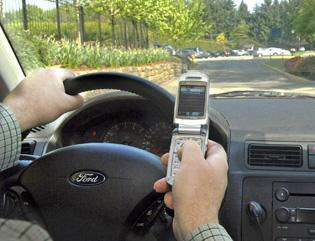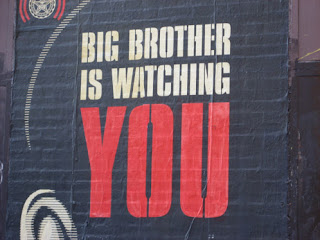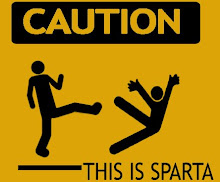Tuesday, September 7, 2010
Big Brother Is Watching. And He's Using GPS
The court maintained that Pineda-Moreno had no expectation of privacy because strangers could come on to the property at any time. My first thought on reading that was that constitutional rights have just become the domain of the wealthy. Someone who can afford to live behind a gated wall or fence (or in a gated community) has an expectation of privacy, but the rest of us don't. Therefore, the fourth amendment applies differently to the wealthy.
The news story I read made several references (as did I in the title of this post) to George Orwell and 1984. But let's not forget Animal Farm — all animals are created equal, but some are more equal than others. What comes after this decision? Will freedom of the press only apply if you can afford your own printing press?
There is a glimmer of hope. In another decision on the other side of the country, the U.S. Court of Appeals for the Washington, D.C., Circuit found very nearly the opposite. This court ruled that the use of a GPS tracker was unconstitutional because it was used to track a suspect over a long period of time. The prosecutor's argument was that the suspect, because he was in public, had no expectation of privacy. The court maintained, however, that though the suspect could have been seen by anyone at any given time, there was no realistic chance that a stranger would have observed the entirety of the suspect's movements over the several weeks during which his movement was monitored. Once again, the device was placed without a warrant.
My next question is, if all this is going on without obtaining search warrants, what else are these agencies up to?
Thursday, March 18, 2010
Constitution, Anyone?

I'm sure you're aware by now that House Speaker Nancy Pelosi has been delving into the Congressional bag of tricks to come up with a way to get Obamacare passed. Faced with an American public that, as a whole, is against having the federal government take over one sixth of the national economy, many representatives who would otherwise vote for the bill (read Democrats) are afraid to because they fear they will be voted out of office in November by an angry constituency.
If nothing else, you have to admire the Speaker's tenacity. She put the chair of the House Rules Committee, Louise Slaughter on the job. The result? "Deem and pass." Through this feat of legal legerdemain, the House will be able to pass the bill without actually voting on it. That way, representatives will be able to tell the folks back home that they didn't vote for it, and they won't even be lying.
How is this possible? When legislation is introduced into Congress, it typically goes through either the Senate or the House first. If approved, it moves over to the other side for approval. Frequently there is a game of Congressional ping pong, where the two houses hit it back and forth with their own spin on it until they shape the legislation something they can agree on. In this case, the Senate has passed a version of the Obamacare bill that is different from the House version. The House will simply agree to the changes and "deem" the bill to have passed without voting on the bill itself.
Can this be for real? Apparently, this trick has been used in the past, and not infrequently. Usually, though, one house is simply accepting amendments to a bill that it has previously voted on. To illustrate, let me present a hypothetical case (any resemblance to actual legislation, living or dead, is purely unintentional). Let's say the House passed a bill saying that airliners had to maintain a minimum altitude within a certain distance of residential housing, then passes it along to the Senate. The Senate adds an amendment stating that airliner landing lights must not be turned on within this distance, either. The House could then accept the amendment without going through the entire voting procedure again. In our hypothetical case, the House would have voted on the basic bill, and there would be a record of who voted for and who against. In the case of Obamacare, however, they are trying to avoid the actual vote altogether.
So what does the U.S. Constitution have to say about this? I'm glad you asked. Here is Article 1, Section 7. I added the emphasis on the part I think most applies here, but I wouldn't want to quote out of context, so I included the whole thing.
All bills for raising Revenue shall originate in the House of Representatives; but the Senate may propose or concur with Amendments as on other Bills.
Every Bill which shall have passed the House of Representatives and the Senate, shall, before it become a Law, be presented to the President of the United States; If he approve he shall sign it, but if not he shall return it, with his Objections to that House in which it shall have originated, who shall enter the Objections at large on their Journal, and proceed to reconsider it. If after such Reconsideration two thirds of that House shall agree to pass the Bill, it shall be sent, together with the Objections, to the other House, by which it shall likewise be reconsidered, and if approved by two thirds of that House, it shall become a Law. But in all such Cases the Votes of both Houses shall be determined by Yeas and Nays, and the Names of the Persons voting for and against the Bill shall be entered on the Journal of each House respectively. If any Bill shall not be returned by the President within ten Days (Sundays excepted) after it shall have been presented to him, the Same shall be a Law, in like Manner as if he had signed it, unless the Congress by their Adjournment prevent its Return, in which Case it shall not be a Law.
Every Order, Resolution, or Vote to which the Concurrence of the Senate and House of Representatives may be necessary (except on a question of Adjournment) shall be presented to the President of the United States; and before the Same shall take Effect, shall be approved by him, or being disapproved by him, shall be repassed by two thirds of the Senate and House of Representatives, according to the Rules and Limitations prescribed in the Case of a Bill.
The way I read it is that for a law to be passed, there has to be a vote, and that vote has to be recorded. Until now. Will they get away with this? Maybe. Hopefully, all this public scrutiny will bring this attempt to a halt. But what if it doesn't?
Let's look at the Bipartisan Campaign Reform Act, better known as McCain-Feingold. The law was passed in February of 2002. The Supreme Court ruled most of it unconstitutional in January of 2010. So for almost eight years, it was the law of the land. If Obamacare gets passed through unconstitutional means, how long might it take to get a Supreme Court ruling against the method used? If the method by which it was passed is struck down, what effect does that have on the legislation itself? Even if it is, will we be in a position to undo something that may have been underway for years? Ruling the method of passing the bill unconstitutional may not rid us of the legislation itself.
Now with any luck, there will be a challenge mounted the instant this bill passes, if it is indeed passed without a vote in the House. And hopefully that will overturn the bill, though I suspect we won't be out of the woods even then. This case does go to show how little regard Congress and the President have for the opinion of the American populace.
It seems we can't relax for an instant.
Friday, March 12, 2010
Texting While Driving

The Florida legislature is considering passing a law banning texting while driving. Actually, they are considering several laws that feature texting, though some address a wider range of distractions. Do we need a law to specifically address texting while driving?
First, let me make something clear. I think sending text messages while driving down the road is dangerous. I think anything that takes too much of a driver's attention from the road is dangerous.
But why do we need a law specific to texting? What about talking on a cell phone? Is it OK, or only OK if you're using a hands-free set? If you can't carry on a phone conversation without being a distracted driver, can you carry on a conversation with someone in the vehicle without being distracted? Do we need separate laws for all of these? Should we have a law against grooming while driving (shaving and applying makeup)? What about those folks who read newspapers and novels while driving?
I don't doubt that texting is more likely to cause an accident than other distractions, but does that mean it deserves its own law? Will it be any comfort to the family of someone killed by a distracted driver that the crash was caused by someone shaving rather than texting?
When you add to that the fact that some of the leading bills under consideration are "secondary enforcement" (police can only enforce them when they stop a driver for some other offense), and this is just a waste of time. Passage of one of these bills will grab a headline or two, and then fade away, leaving the public to think that "something has been done."
People who are at fault for crashes are liable for the results. If the penalties available aren't severe enough, then that is where we should be directing our efforts. If we want to stop distracted driving, make it illegal to have anything in the driver's hand that isn't the steering wheel, and let law enforcement officers pull over offenders.
I think we're better off simply doing nothing than going to the trouble passing legislation that does nothing.
Monday, March 1, 2010
McDonald v. City of Chicago
This is widely being seen as a gun rights case, which it is, but it's much more than that. A SCOTUS (Supreme Court Of The United States) decision against Chicago would set a precedent that could be cited in civil liberties cases that involve anything covered by the bill of rights.
I'm not a federalist per se, but pretty much anything that promotes individual liberty and reduces government involvement in my life is a good thing.
It has been said that the second amendment guarantees the rest. If SCOTUS rules in favor of McDonald, that will come true without a shot being fired.
Monday, January 4, 2010
"Independents" Day
I could never bring myself to go along with the "throw the bums out" movement that has appeared on the Internet, talk radio and in my email in box. While I agree wholeheartedly with the sentiment, I know that very few Democrats will do it. That means that conservatives will split their votes, and Democrats will increase their majority. And I'm pretty sure that's why the bums are still in office.
Like many conservatives, it has been a long time since I have voted FOR someone. I always seem to find myself voting AGAINST someone. My vote goes to whomever I believe represents smaller government. Nowadays, this means the person who will grow the government less. I don't seem to get the option I want, which is to actually reduce the size of government.
Party politics
In my view, the Democratic party represents perhaps the greatest threat on earth to our country, our liberty, and our way of life. Unfortunately, I believe the Republican party isn't very far behind them.
The problem is that politicians in each party owe their allegiance to their party above all else. They only represent us when we make enough of a fuss to threaten their chances for reelection. And they know that, collectively, we have a short memory and, usually, low willpower.
I think it's time to find a way to make every office holder more responsible — and responsive — to us.
"Independents" Day
Something I could get behind is an "Independents" Day. On election day, I could "throw the bums out" as long as there is an independent candidate running. I wouldn't be trading one party hack for a hack from another party. I would be voting for someone whose only political allegiance is to the voters.
What would it take to get something like this started?
Tuesday, July 28, 2009
Welcome
It's a cliche that freedom isn't free. It's also the cold, hard truth. Most people don't even recognize what freedom is, or its inextricable link to responsibility. Many people believe that freedom from responsibility is the ultimate liberty. But I'm here to tell you that freedom means taking charge of your own life and living with the consequences — good or bad — of your own decisions.

